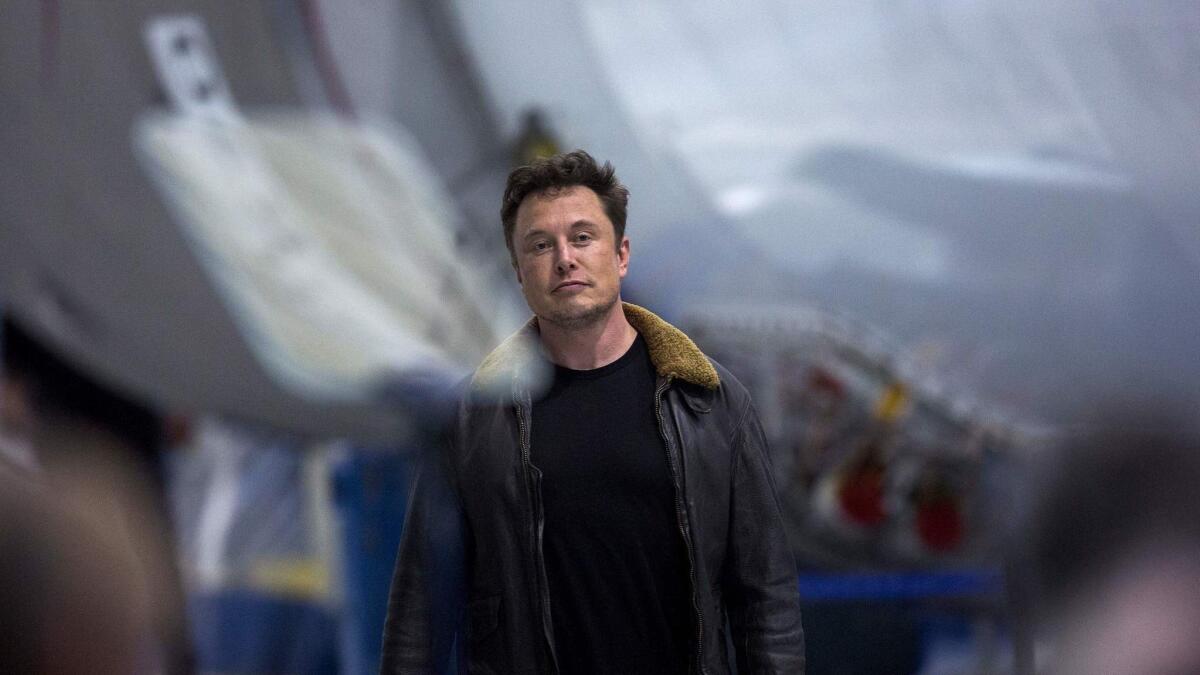Twitter restrictions on Elon Musk are set to take hold. But is anyone at Tesla willing to reel him in?

- Share via
Elon Musk revels in bad boy behavior on Twitter, with fart jokes, accusations of pedophilia, insults directed at the Securities and Exchange Commission, and much more.
“Twitter is a war zone,” he said in a recent “60 Minutes” TV interview. “If somebody’s going to jump into the war zone, it’s like, OK, you’re in the arena, let’s go.”
On Friday, Tesla’s board of directors takes on the uncomfortable role of peacekeeper. Under a fraud settlement Musk signed with the SEC in September, Tesla’s board must now “oversee” Musk’s public communications, including his Twitter feed.
Most of the details are left to the directors. There is no requirement that the company review all of Musk’s tweets. The company is, however, required to “pre-approve” written communications from Musk that include “information material to Tesla or its shareholders.”
Whether the oversight will fundamentally alter Musk’s Twitter activity is open to doubt. He’s been tweeting freely since the settlement was signed. The only tweets that would call for review, he told “60 Minutes,” are those that might move the stock price. Any further restrictions, Musk said, would violate his 1st Amendment rights.
Elon Musk says ‘pedo’ insults aimed at cave-rescue volunteer are protected by 1st Amendment »
Musk took the opportunity on “60 Minutes” to toss another taunt: “I do not respect the SEC,” he said. “I do not respect them.”
Exactly why Musk lacks respect for the SEC is unclear. If he was asked to explain that in the interview, “60 Minutes” didn’t broadcast it.
Jay Dubow, a lawyer at Pepper Hamilton who served with the SEC’s enforcement division early in his career, offers one possibility: The settlement, he said, is weak.
“I thought it was weak from the outset,” he said. Although Musk lost his chairman title, he remains chief executive and still sits on the board, which will soon gain two new independent directors, also part of the SEC settlement. He continues to own about 20% of Tesla shares.
It is unclear what additional obligations the Tesla board might place on Musk or how such oversight might work. The settlement requires Musk to “comply with all mandatory procedures implemented by Tesla” pertaining to his public communications, but leaves the board to establish the procedures as it sees fit.
Also required: the creation of a board committee comprising independent directors to oversee the terms of the settlement. Under the SEC deal, the company must designate an experienced securities lawyer to review Musk’s communications “consistent with” procedures approved by the board. On Dec. 6, Tesla hired a new general counsel: Dane Butswinkas, chairman of Williams & Connolly and a well-known trial lawyer.
If the board has approved any procedures under the settlement, they have not been made public. Asked whether the procedures would be made public, Tesla declined to respond.
Musk’s controversial tweets include one that accused a Thai-cave rescue diver of being a “pedo” and “child rapist.” (Musk has asked a court to dismiss a defamation suit filed by the diver, claiming the tweets were opinions protected by the 1st Amendment.) But the tweet that caused Musk trouble with the SEC and shocked Tesla followers came on Aug. 7, when he claimed he had “funding secured” for a mega-deal to take Tesla private at a valuation estimated at $70 billion. The stock surged on the tweet, then fell back as it became clear that Musk hadn’t secured any funding for any private deal.
Dubow pointed out, along with many other securities law experts, that the funding-secured tweet presents an obvious example of an untrue statement that had material consequences for shareholders, a clear violation of SEC rules. But most cases that involve “material” information are not so clear-cut, and that could give Musk some leeway on his public statements.
Supreme Court decisions and guidance from the Financial Accounting Standards Board and the SEC boil down to two main thresholds for determining when information is material to shareholders, Dubow said. First, the information must be something a reasonable shareholder or potential shareholder would want to know when making decisions to buy or sell. Second, the material must “alter the total mix of information” available to investors about the company in question.
The funding-secured tweet “very clearly” met both thresholds, Dubow said. But what about shifting promises about how many Model 3s Tesla will produce and sell? Or Musk’s Nov. 19 tweet promising to double Supercharger capacity by the end of 2019?
“Materiality is often a hindsight test,” Dubow said. “Sometimes you don’t know if stockholders are going to react to it.”
That’s what Musk was getting at in the “60 Minutes” interview, when he answered a question about how the company could determine whether a tweet would move the stock price if it wasn’t reviewing all his tweets. “I guess we might make some mistakes,” he said. “Who knows? Nobody’s perfect.”
Anyone who thought the SEC settlement would result in a neutered Twitter feed from Musk might be in for a surprise.
Twitter: @russ1mitchell







